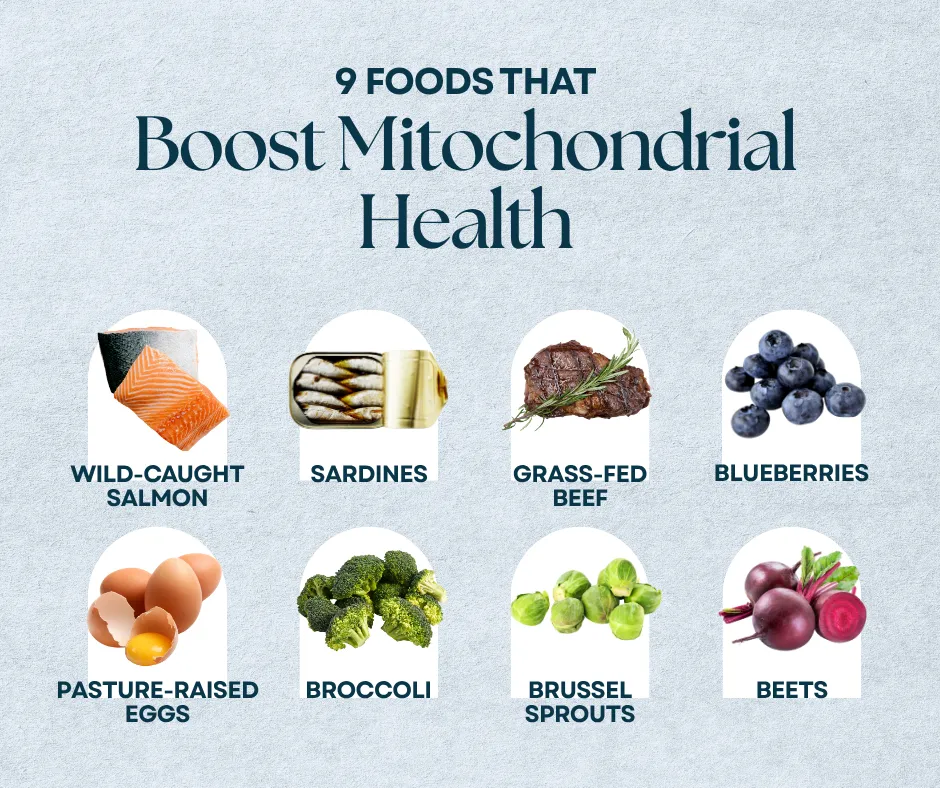
Boost Mitochondrial Health with These 9 Foods
Mitochondria are the powerhouses of your cells. They play a crucial role in producing energy, so taking care of them is essential for overall health. Luckily, the right foods can help support and enhance mitochondrial function. Here are nine foods that can boost mitochondrial health and keep you feeling energized.
Key Takeaways
Mitochondria are essential for energy production in cells.
Certain foods can improve mitochondrial health.
Incorporate these foods into your diet for better energy levels.
Natural, whole foods provide the best support for mitochondria.
Berries, fish, and greens are all excellent choices.
The Power of Nutrient-Dense Foods
Eating nutrient-dense foods gives your mitochondria the support they need to function optimally. Without proper nutrition, mitochondria cannot effectively turn food into the energy your body and brain require.
1. Wild-Caught Salmon
Rich in omega-3 fatty acids, wild-caught salmon is great for mitochondrial health. These healthy fats help reduce inflammation, a key factor in keeping your cells and mitochondria functioning properly.
2. Sardines
Sardines are another excellent source of omega-3s and contain Coenzyme Q10 (CoQ10), a compound involved in energy production within mitochondria. Consuming sardines can strengthen your cells' energy processes.
3. Grass-Fed Beef
Grass-fed beef offers a perfect blend of nutrients like iron, zinc, and vitamins B6 and B12, all of which are vital for mitochondrial function and energy production. Consuming grass-fed beef provides high-quality protein and essential nutrients for your mitochondria.
4. Blueberries
Blueberries are rich in antioxidants, which help protect mitochondria from damage. They also contain compounds that can promote brain health and support energy levels, making them a perfect snack or addition to your breakfast.
5. Pasture-Raised Eggs
Eggs from pasture-raised chickens are packed with high-quality proteins and healthy fats, supporting mitochondrial health. They're also a rich source of essential vitamins like B12 and antioxidants that aid energy production.
6. Broccoli
Broccoli is a nutrient powerhouse, rich in vitamins C, E, and K. These vitamins offer protection to mitochondria and help maintain their optimal function. Including broccoli in your meals can support your body's energy production system.
7. Brussel Sprouts
Brussel sprouts are loaded with fiber, vitamins, and antioxidants. Eating them can help reduce oxidative stress, a known factor in mitochondrial damage. Their fiber content also supports healthy digestion, which is crucial for nutrient absorption.
8. Beets
Beets contain nitrates that can enhance mitochondrial efficiency. These root vegetables help improve oxygen utilization in your cells, which is essential for energy production. Adding beets to salads or smoothies is a tasty way to boost your energy levels.
A Simple Approach to Mitochondrial Health
Incorporating these foods into your diet creates a solid foundation for maintaining healthy mitochondria. Aim to include a variety of these foods throughout the week. Choose whole, unprocessed options whenever possible to maximize nutrient intake.
Remember, taking small steps towards better nutrition can have a significant impact on your energy levels and overall well-being. Start with one change at a time, and over time, you'll build a diet that supports strong and efficient mitochondrial function.
Conclusion
Your mitochondria have a direct impact on how you feel every day. By prioritizing nutritional choices that support mitochondrial health, you create a foundation for sustained energy and well-being. Focus on incorporating a variety of nutrient-dense foods into your meals, and enjoy the benefits of improved energy and vitality.
